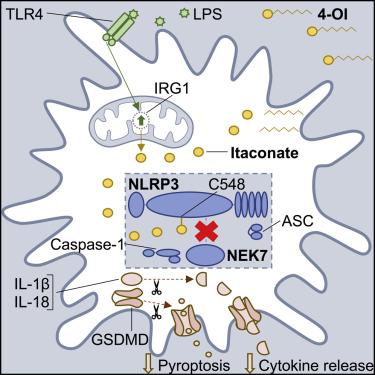Cell Metabolism ( IF 29.0 ) Pub Date : 2020-08-12 , DOI: 10.1016/j.cmet.2020.07.016 Alexander Hooftman 1 , Stefano Angiari 1 , Svenja Hester 2 , Sarah E Corcoran 1 , Marah C Runtsch 1 , Chris Ling 3 , Melanie C Ruzek 4 , Peter F Slivka 4 , Anne F McGettrick 1 , Kathy Banahan 1 , Mark M Hughes 1 , Alan D Irvine 5 , Roman Fischer 2 , Luke A J O'Neill 1

|
The Krebs cycle-derived metabolite itaconate is highly upregulated in inflammatory macrophages and exerts immunomodulatory effects through cysteine modifications on target proteins. The NLRP3 inflammasome, which cleaves IL-1β, IL-18, and gasdermin D, must be tightly regulated to avoid excessive inflammation. Here we provide evidence that itaconate modifies NLRP3 and inhibits inflammasome activation. Itaconate and its derivative, 4-octyl itaconate (4-OI), inhibited NLRP3 inflammasome activation, but not AIM2 or NLRC4. Conversely, NLRP3 activation was increased in itaconate-depleted Irg1−/− macrophages. 4-OI inhibited the interaction between NLRP3 and NEK7, a key step in the activation process, and “dicarboxypropylated” C548 on NLRP3. Furthermore, 4-OI inhibited NLRP3-dependent IL-1β release from PBMCs isolated from cryopyrin-associated periodic syndrome (CAPS) patients, and reduced inflammation in an in vivo model of urate-induced peritonitis. Our results identify itaconate as an endogenous metabolic regulator of the NLRP3 inflammasome and describe a process that may be exploited therapeutically to alleviate inflammation in NLRP3-driven disorders.
中文翻译:

免疫调节代谢物衣康酸酯修饰 NLRP3 并抑制炎症小体激活。
克雷布斯循环衍生的代谢物衣康酸酯在炎性巨噬细胞中高度上调,并通过对靶蛋白的半胱氨酸修饰发挥免疫调节作用。NLRP3 炎症小体可裂解 IL-1β、IL-18 和 gasdermin D,必须严格调控以避免过度炎症。在这里,我们提供了衣康酸酯修饰 NLRP3 并抑制炎症小体激活的证据。衣康酸酯及其衍生物衣康酸 4-辛酯 (4-OI) 抑制 NLRP3 炎性体激活,但不抑制 AIM2 或 NLRC4。相反,衣康酸耗尽的Irg1 中NLRP3 激活增加-/-巨噬细胞。4-OI 抑制 NLRP3 和 NEK7 之间的相互作用,这是激活过程的关键步骤,以及 NLRP3 上的“二羧基丙基化”C548。此外,4-OI 抑制了 NLRP3 依赖性 IL-1β 从冷热蛋白相关周期性综合征 (CAPS) 患者分离的 PBMC 释放,并减少了尿酸盐诱导的腹膜炎体内模型中的炎症。我们的研究结果将衣康酸确定为 NLRP3 炎症小体的内源性代谢调节剂,并描述了一个可用于治疗减轻 NLRP3 驱动疾病炎症的过程。



























 京公网安备 11010802027423号
京公网安备 11010802027423号